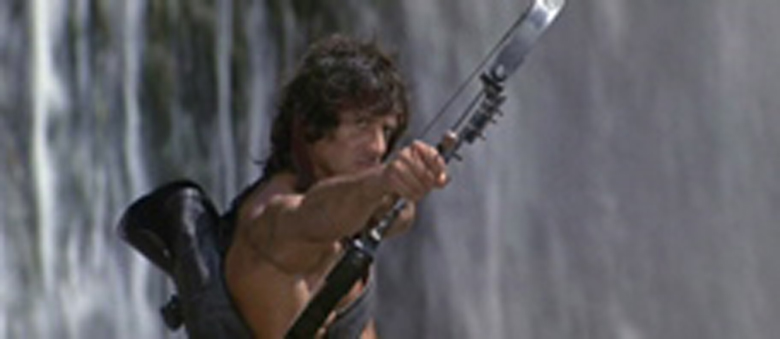Reviews
George P. Cosmatos
USA, 1985
Credits
Review by Cullen Gallagher
Posted on 06 July 2009
Source Lion’s Gate DVD
Categories Favorites: The Action Movie
REQUIEM FOR A HEAVYWEIGHT
If there’s a fundamental difference between First Blood and the sequel made three years later, Rambo: First Blood Part II, it’s that Rambo’s psychological scars seemed to have finally healed. He is no longer the tormented vet wandering the woods of America in search of vestiges of some unknown he could vaguely call “home.” Instead, as the film opens, we find him in prison, breaking rocks under the hot sun. “In here, at least I know where I stand,” he tells Col. Trautman, who has come to arrange his release in order to send him on a mission to locate missing POWs still believed to be in Vietnam. As Rambo stares through the chain-link fence at his former commander, his gaze is cool yet heated. Distrust and disappointment, that unrequited rage, still boils beneath the surface, yet he knows that he has lost the two wars that meant the most to him: the one in Vietnam where he was reborn as a soldier, and the war back at home to make his nation understand what he and his fellow soldiers went through. It’s not that he’s defeated, but that he’s given up the good fight. Rambo knows now that the world won’t listen, won’t change.
So why does he accept Trautman’s offer to head back to Vietnam? Certainly not just to get out of jail, for his declaration of ambivalence seemed absolutely sincere. Instead, it’s because those prisoners of war are the last remnants of Rambo’s world. It’s like he says: part of him died back there in the jungle with all his friends. This mission, then, is an opportunity to find a part of him that died, for him to being to live again. America, that fabled “Land of Opportunity,” holds nothing for him. He tried to live the mythology and uncovered its lies. Like returning to the womb, Rambo heads back to the only place that he can truly call home.
HISTORY REVISITED/REVISED
“Sir, do we get to win this time?” Rambo asks before Trautman leaves. “This time, it’s up to you,” the Colonel replies. If First Blood can be seen as the effect of the past on the present, then Rambo: First Blood Part II is about the effect of the present on the past. It not only investigates how we remember history, but also the possibility of whether or not our current actions can somehow alter what has already come to pass. Rambo’s mission to Vietnam is not just about rescuing soldiers left behind when the war ended a decade prior, but about reaching some resolution for a war whose conclusion was just as murky, vague, and shrouded in lies as the reasons for its initiation.
For Rambo, the war was seemingly simple: he was drafted at age 17, trained as a Green Beret, taught to kill, and told to win. The politics of involvement were meaningless to him—up until the point when he realized that there was no clear objective, no deliberate path to victory. Rambo found himself caught in a vise in which failure was unavoidable and success impossible. He felt betrayed by his own side: deployed as fodder for the enemy, fed lies to keep going, then tossed aside for reasons he couldn’t understand—and still can’t.
In the context of Rambo: First Blood Part II, to win the war is a matter of killing the enemy and rescuing American GIs. It’s a completely imaginary war devoid of the reality of history (the film even entertains the now-dated fantasy that Russian Communist forces dragged out the Vietnam War into the 1980s). But this is just the way that Rambo wants it. Real life was too complicated for him, its ambiguities irresolvable. When Trautman tells him, “This time, it’s up to you,” he gives Rambo permission to re-ignite the Vietnam War, but this time on Rambo’s terms. Terms in which success was a possibility.
OUT OF THE PAST
This sequel attempts to clarify many of the ambiguities of Rambo’s past that went unanswered in the first film. In a brief but important scene, Murdock - the military brains behind Rambo’s operation - does a quick rundown of Rambo’s record. In some ways, it helps to mould him as a character; in others, it strips the mythological aura from him, turning a mystery into something concrete and palpable.
His full name: John J. Rambo. While his full name was also mentioned in First Blood, it is worth considering what deeper implications it may have (if any). Perhaps it is only coincidence, but one of America’s Founding Father’s was John Jay, who was a one-time President of the Congressional Congress, the first Chief Justice of the United States, Governor of New York, and an outspoken opponent of slavery. If Rambo is to be seen as the inheritor of an All-American past in an era of widespread Benedict Arnolds, then this connection to the foundation of America makes sense. And even if it is not intentional, it is certainly a fitting accident.
Last name: Rambo. It’s a name seemingly without ancestry. Two syllables that do not belie either his, or his family’s origin. Ram: animalistic, strong, connection to nature. Bo: like the bow that, in this second film, is his weapon of choice. Later in the scene, it is revealed that he is half-Native American, half-German. Yet another connection to American history, but also a heritage of living with nature, and fighting for his identity and beliefs against oppressive “American” forces.
Hometown: Bowie, Arizona. Reference to Jim Bowie, famous pioneer and fighter at the Alamo. Both he and Rambo are known for their deadly skills with a knife. A more obvious and plausible connection than John Jay.
ANCIENT TRADITIONS, FUTURE POSSIBILITIES
Entering the base in Thailand, Rambo is shown a gigantic computer console taking up an entire room. Told it is just for him, the lights beep and flash like something out of Desk Set, or any film from the 1950s or 1960s that tries to imagine what computers of the future will be like. Fascinated but ultimately disinterested with it, he stares at the computer during the debriefing like a displaced man from another era.
Equipped with modern submachine guns and a camera, Rambo is ordered to take pictures of the hostages and not engage the enemy. “Don’t try the blood-and-guts routine. Let technology do most of the work,” Trautman orders Rambo. But Rambo is not a modern man: deeply rooted in the past and preoccupied by history, he has proved time and again that he is at his best alone in nature with the barest of tools. In First Blood, it was his knife. In Rambo: First Blood Part II, the bow is added to his arsenal. “I’ve always believed that the mind is the best weapon,” says Rambo. “Times change,” replies Murdock. “For some people,” answers Rambo, reminding that Rambo’s modus operandi has not - and will not - change.
While making his jump from the helicopter, the new gadgetry attached to Rambo gets caught up on the plane and prevents him from opening his parachute. Metaphorically jettisoning the weight of modernity and the tools of his enemy, Rambo cuts away the camera and the submachine gun, leaving himself only with his knife and bow. His own man once again, he falls into the jungle to complete his mission.
BIOLOGY
One of the biggest divergences from First Blood is in the addition of a love interest in Rambo’s life. Whereas the first film had only two minor female speaking parts in the opening scene (and only a half-dozen or so recognizable female extras in the rest of the film), Rambo: First Blood Part II has only one female part, though it is far more crucial to the plot.
Co Bao is Rambo’s guide through Vietnam. She meets him in the jungle, brings him to the pirates who carry them up river, and delivers him to the hidden base where the prisoners are kept. She also later rescues him from the prison camp once he is captured. More than just integral to the mechanics of the story, she is intended to be Rambo’s female counterpart. Both were reborn spiritually in the jungle and feel an innate connection with war; they are both capable fighters, short on words, and loyal to the end. And even though she’s a woman, she is such a tomboy that her sexuality is anything but threatening to Rambo. In fact, that she wears men’s clothing and carries a gun is probably a comfort to him. Just like Trautman at the end of First Blood, she coaxes out of Rambo more words than anyone else in the script. He opens up to her, discusses his past, his anxieties, and his plans for the future, albeit uncertain and vague at this point.
Their connection is not based on sex or biology, but on shared experiences from the war. Even though Rambo’s muscles are sexualized by the camera (shown in close-up, dripping with sweat), he is essentially a sex-less character. Twice during his initial raid on the prison camp, he must cross under a hut in which an enemy officer is having relations with a prostitute. Both times we are shown Rambo’s face, frozen in mid-glance. So swiftly he moves through enemy lines, as though he is instinctively aware of their movements before they make them. So why is he surprised, literally stopped in his tracks, by sex?
There’s a particularly pre-adolescent quality about Rambo. He’s a kid’s idea of a man’s man, living in a man’s world, doing masculine things. Sex isn’t even a mystery at this point—it’s non-existent. He seems completely unaware of his physiognomy except for its capability to aid him in the jungle and in combat.
Part of Rambo’s appeal is this innocence that is out of step not only with the current world, but also the current cinema. The “R” rating it received was for pure, unadulterated, shoot-em-up violence. Little profanity, no gore, and absolutely no sex whatsoever. Much like Rambo’s reduction of the Vietnam War to a cut-and-dry win-lose scenario, the elimination of gender from the films simplifies not only the relations between the characters, but also our sympathy for them. There’s no tempting the audience with attractive bad guys/girls, no toying with our desires and making us complicit with their evil deeds. In the dichotomous world of Rambo, there are only two sides, and neither has anything to do with gender. You’re either with Rambo, or you’re at the wrong end of one of his many weapons.
VENGEANCE IS MINE
Rambo’s complex relationship to America reminds of another vigilante but from a previous war: Mike Hammer. Mickey Spillane’s fictional private eye was the epitome of post-World War II white male anxiety, and what he and Rambo share is this sense of being the last line of defense for humanity in a world that’s lost all sense of morality. Both of them products of the Cold War, Hammer’s reoccurring foe are the Communists, and Rambo also faces off against them in the second and third films in the series. They are convenient villains rooted entirely in fantasy notions of immorality, perversity, and utter stupidity. Both Rambo and Spillane make mincemeat of vast numbers of armed Communists as though they were carrying toy guns.
But more than their large body count of dead Communists, the two are kindred loners, suspicious of a world that neither trusts nor values them, outcasts because they seek to protect a world that hunts them in return. Hammer has nothing but disdain for the police, except for Captain Pat Chambers; likewise, Rambo is deeply embittered with the military, except for Col. Trautman. They are vigilantes, and as such the political motivations of their missions are hidden within personal vendettas. Rambo is rescuing prisoners from the same camp that he escaped from over a decade prior. He is doing more than bringing them home: he is bringing everyone home who has died over there; he is resurrecting his fallen friends’ memory and reminding the world of their sacrifice; he is making good on a promise he made to himself in the first film: not to let them be forgotten.
A REMEBRANCE OF THINGS PAST
When Rambo arrives at the landing zone with a live P.O.W. - a direct breach of orders, which specifically asked only for photographic evidence - Murdock gives the order to abort the mission and abandon Rambo and the prisoner in the field. Taken prisoner, Rambo must now escape and rescue the prisoners all on his own, without the cooperation of the American military. This betrayal only confirms what Rambo has known all along: authority can’t be trusted.
Yet when Rambo radios in at the end, reporting to the base that he is en route with the hostages, Trautman and all the base personnel - sans Murdock and his cronies - cheer. For the first time, Rambo is not alone. There is now a division in the nation between the government (represented by the white-collar Murdock) and its citizens (represented by the nameless mass of workers). Whereas once Rambo was forgotten, ignored, spited, and villainized, now he is valorized. For once he gets to play the hero, a role denied him since his return to America at the close of the war.
Reprising the finale of First Blood, Rambo grabs an M-60 machine gun, wraps the belt of bullets around his arm, and proceeds to shoot up the office. Computers and file cabinets, symbols of bureaucracy and modernity (two things Rambo never trusts), are obliterated. “You know there’s more men out there. You know where they are. Find them. Or I’ll find you,” Rambo orders Murdock, but he’s looking right into the camera, straight into the eyes of the audience. Breaking the fourth wall in a big way, the film conflates the fantasy history of Vietnam with real life. It takes a giant leap and demands that its fictional hypothesis is fact, and that we’re complicit in the cover-up. As an act of political didacticism, it doesn’t quite work: Rambo functions best on the level of mythology, not reality.
WHAT MAKES SAMMY RUN
First Blood ended with a torrent of sincere emotion. Closed-lipped for the entire movie, in the final scene Rambo finally let loose an epic confession of confusion, anxiety, and impotence. It served to humanize his character and contextualize his actions within a larger framework of disappointment and struggle.
The ending of Rambo: First Blood Part II tries for a similar note of catharsis and fails. Much like the direct-address scene with Murdock, the film delivers an overdose of simplistic and didactic resolution. Says Rambo, “I want what they want, and every other guy who came over here and spilled his guts and gave everything he had wants: for our country to love us as much as we love it. That’s what I want.” This in no way elucidates our understanding of Rambo, nor complicates it. It’s oddly political, the sort of speech that appeases large numbers by refusing to commit to anything specific or potentially divisive. Candidate Rambo is not the same as tormented, haunted Rambo.
The movement from First Blood to Rambo: First Blood Part II is that of anti-hero to action-hero. The first film ended on an unsettling moment of emotional and psychological breakdown, with Rambo being taken in handcuffs to jail. His future is left ambiguous. Its sequel maintains the ambiguity about the future, but its tone is decidedly more triumphant. The prisoners of war have been rescued—mission accomplished. And as for Rambo? He has decided to stay in the jungles of Southeast Asia, to go to the only home he has left.
But the film doesn’t end there. Didacticism rears its ugly head once more in the guise of Frank Stallone’s cheesy, patriotic anthem, “Peace in Our Life.” Crooning over synthesizers and drum machines, Stallone sings,
Peace in our life
Remember the call
A cheer for my brothers
Think of them all
Home of the brave
We’ll never fall
The strength of our nation
Belongs to us all.
Eschewing the vulnerability of the first film’s finale, this conclusion is as jacked and unambiguous as Rambo’s muscles. Cloying, nationalistic sentimentality has replaced unquenchable rage. Instead of fighting against the masses, he is now fighting for them. In the course of just two films, Rambo has made the transition from fringe outcast to mainstream commodity in its most commercial form: a series character.
More Favorites: The Action Movie
-

First Blood
1982 -
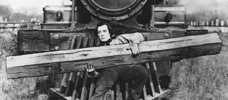
The General
1926 -

The Running Man
1987 -

Guns
1990 -

Highlander
1986 -

Death Race 2000
1975 -
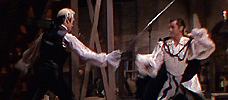
Scaramouche
1952 -

Do or Die
1991 -
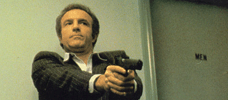
Thief
1981 -

Mission: Impossible
1996 -

Invasion U.S.A.
1985 -

Rambo: First Blood Part II
1985 -

Bullitt
1968 -

Hard Hunted
1992 -

The Fugitive
1993 -

Kindergarten Cop
1990 -

Under Siege
1992 -
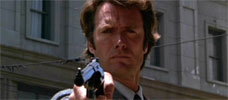
Dirty Harry
1971 -
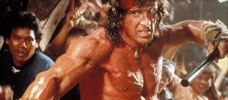
Rambo III
1988 -

Public Enemies
2009 -

Day of the Warrior
1996 -

The Good, the Bad, the Weird
2008 -
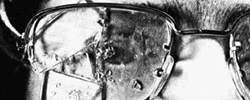
Straw Dogs
1971 -

Die Hard
1988 -

Con Air
1997 -

Collateral Damage
2002 -
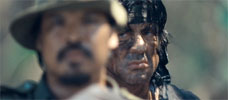
Rambo
2008
We don’t do comments anymore, but you may contact us here or find us on Twitter or Facebook.



